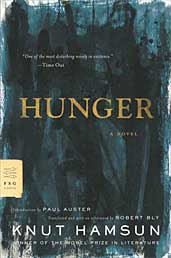 If I had read this book without any context, I would have assumed it was a modernist work highly influenced by Kafka. It's hard to believe that it was originally published in 1890.
If I had read this book without any context, I would have assumed it was a modernist work highly influenced by Kafka. It's hard to believe that it was originally published in 1890.The narrative is a first-person account by an unnamed Norwegian writer. He wanders the streets of Christiana (current day Oslo), starving and trying to sell his work to the local newspaper. As he becomes more and more hungry, he loses his grasp on reality and is driven to do some perplexing and awful things. He is a masochist, playing survival as if it's a game of him versus the world.
For those who like linearity, this book should be discounted. The narrator and story move in circles until the very end. This can be frustrating, but there is something mesmerizing about the character that keeps you reading.
A quote on the front deems the book, "one of the most disturbing novels in existence". You've been warned.
